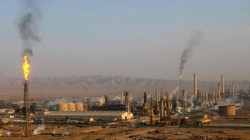Oil prices ease on China demand worries, supply forecasts

Shafaq News/ Oil prices drifted lower on Friday after rallying the day before, as geopolitical tensions and disruptions in U.S. oil production from a cold blast were countered by concerns over slow demand growth in China and ample supply forecasts.
Brent crude futures fell 23 cents, or 0.3%, to $78.87 a barrel by 0420 GMT, and U.S. West Texas Intermediate crude futures (WTI) slid 7 cents to $74.01.
Both benchmarks, which gained about 2% on Thursday as the International Energy Agency (IEA) joined producer group OPEC in forecasting strong growth in global oil demand, are on track to end the week around 1-2% higher.
On Thursday, the IEA again raised its 2024 global oil demand growth forecast, though its projection remains lower than OPEC's expectations, and said the market looked well supplied because of strong growth outside the producer group.
The IEA expects world oil supply to rise by 1.5 million bpd to a new high of 103.5 million bpd in 2024, fuelled by record-setting output from the United States, Brazil, Guyana and Canada.
Pakistan launched strikes on separatist militants inside Iran on Thursday, in a retaliatory attack two days after Tehran said it struck the bases of another group within Pakistani territory.
"As tensions in the Middle East are spreading, traders don't want to take short positions, but they are also cautious about continuing to build long positions as China's economic recovery remains slow," said Hiroyuki Kikukawa, president of NS Trading, a unit of Nissan Securities.
There are also worries that the U.S.-China conflict could attract attention again as the U.S. election approaches, which would be negative for energy demand, he said.
"Unless tensions in the Middle East quickly escalate further, WTI is likely to continue trading in a range around $70-$76," he said.
Two oil tankers that had diverted away from the Red Sea have turned back and passed through the Bab al-Mandab Strait, ship-tracking data showed, though tensions in the region continued to disrupt global shipping and trade.
Tanker traffic through the Bab al-Mandab Strait for Jan 13 - 17 was down 58% on the same period in 2023, data from consultancy Vortexa indicated.
Attacks on U.S. ships by Houthi rebels continued on Thursday, nearly a week after the United States and Britain launched strikes against their positions in Yemen.
Beyond the Middle East, the U.S. Energy Information Administration (EIA) on Thursday reported a larger-than-expected draw in crude inventories of 2.5 million barrels on strong demand from refineries in the week ended Jan. 12, but gasoline and distillate inventories rose to multi-year highs.
Meanwhile, about 40% of oil output in North Dakota, a top oil-producing U.S. state, remained shut-in due to extreme cold weather and operational challenges, the state's pipeline authority said on Wednesday.
(REUTERS)





